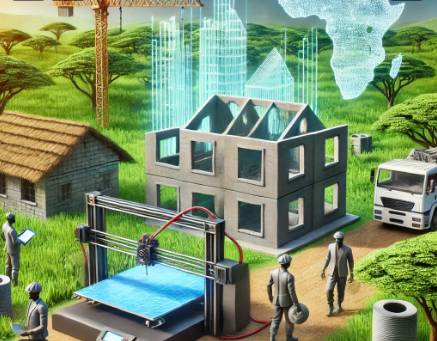Greening Africa's Infrastructure with Digital Innovation
Subtitle: Leveraging Digital Transformation for Sustainable Development in Africa
Introduction
As Africa emerges as a dynamic hub for construction and infrastructure development, integrating digital technologies to "green" the sector is becoming essential. African-led innovations, particularly in digital and green technologies, are reshaping the continent’s approach to construction, making it faster, more efficient, and environmentally responsible. This article explores how African countries are adapting digital tools to meet rising infrastructure demands while promoting sustainable, eco-friendly practices.
Driving Infrastructure Growth to Meet Demand
With Africa's population projected to reach 2.4 billion by 2050, the demand for robust infrastructure is unprecedented. Rapid urbanization has seen African cities grow by more than 160 million people between 2015 and 2023. The African Development Bank estimates a need to mobilize $100 billion annually to close the infrastructure financing gap, which is essential to support this population surge.
Digital Transformation in Construction
Advances in digital technology are fundamentally reshaping construction processes across Africa. Investment in global construction technology reached $50 billion between 2020 and 2022, reflecting strong trust in the benefits of digitization. Tools like augmented reality assist in urban planning, while 3D printing, artificial intelligence, and blockchain streamline building design and project management. Technologies such as IoT and AI also support sustainable building efforts, reducing energy consumption and improving resource efficiency. For example, Botswana has implemented drones, 3D printing, and green technologies to enhance resource infrastructure, primarily through labor-intensive projects funded by the private sector.
Embracing Green Building Technology
Africa's construction sector has a unique opportunity to become a leader in green building practices. With 70% of Africa’s 2040 building stock yet to be constructed, sustainable approaches are essential. The construction industry is responsible for around 40-50% of global carbon emissions, making it critical for African countries to adopt green building practices from the start. Through 3D printing, construction projects have seen carbon footprints drop by nearly half and construction times cut by 70%. South Africa, valued at $25.5 billion in its construction market as of 2024, exemplifies the growing demand for green infrastructure, with green building growth rates outpacing other regions worldwide.
Strategies for a Greener Future
To fully benefit from Fourth Industrial Revolution (4IR) technologies, African countries must adopt long-term strategies that prioritize digital transformation within construction. Given the long-term nature of infrastructure projects, governments should develop policies that transcend election cycles, with plans rooted in sustainable development goals and digital innovation. A strong, stable commitment to digital integration will position Africa to capitalize on its unique resources, such as a large youth population and abundant natural materials.
1. Long-Term Strategic Planning: African countries should prioritize enduring strategies to integrate digital tools across infrastructure projects. This approach ensures continuity beyond the election cycle, allowing infrastructure projects to benefit from long-term planning and consistent funding.
2. Customizing Technology to National Needs: Recognizing each country’s distinct advantages, governments can select technologies that align with their resources and goals. For example, countries with access to unique natural resources might focus on developing local, bio-based materials for 3D printing, which can help reduce costs and greenhouse gas emissions.
3. Strengthening Partnerships for Knowledge Transfer:** By collaborating with advanced economies like the U.S. and China, African countries can gain invaluable expertise. Partnerships with universities and industries offer the potential for knowledge sharing, which will help African countries build technical capabilities domestically.
Conclusion
With the right strategies, African nations can harness digital and green technologies to redefine their construction industry. From residential buildings to critical infrastructure like roads and bridges, Africa is well-positioned to embrace a sustainable and tech-driven future, leading the way in responsible construction practices. A long-term, strategic approach will empower African countries to address critical infrastructure needs while protecting the environment, making Africa a global pioneer in sustainable development.



No comments yet
Be the first to share your thoughts!